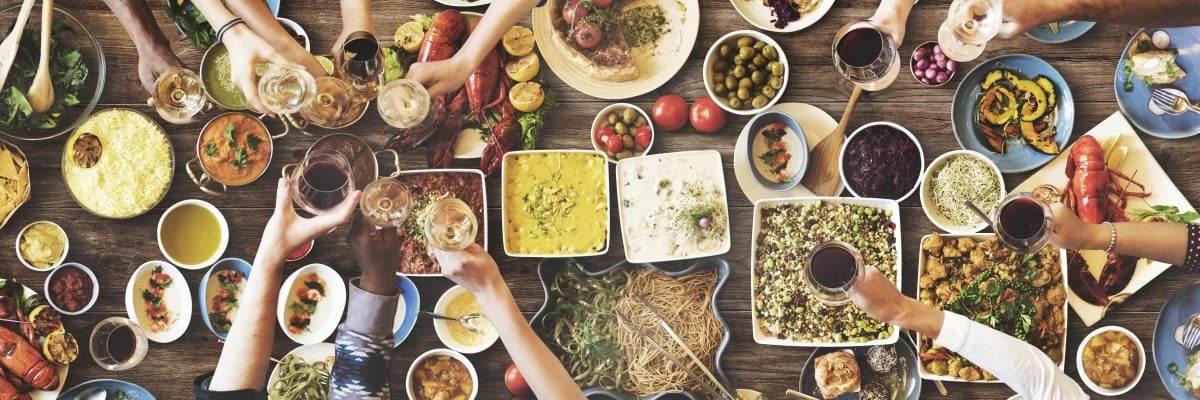
Homily for Easter Sunday, Year B
“Who ate and drank with him after he rose from the dead.”
-Acts 10:41
Why do we eat and drink?
All animal species take nourishment in one way or another, and even plants assimilate water and nutrients. Eating and drinking are actions we undertake in order to maintain our individual life. Since this activity is so essential to our existence and well-being, it is accompanied by a pleasure that provides us with a complimentary motivation for maintaining our lives, literally “keeping body and soul together,” as one sometimes hears people say about eating. We eat in order to stave off bodily illness and death, and we also enjoy it.
But what about the case of someone who is immortal, that is, whose body and soul are inseparable and will never be parted, so that he will never die? When such a one eats, what could be the purpose? “Christ being raised from the dead, dies no more” (Rom. 6:9) the apostle tells us. And yet, the celebration of the mystery of Our Lord’s glorious resurrection on the third day is closely associated with eating and drinking together. As St. Paul also tells us, “Christ our Passover has been sacrificed for us, let us therefore keep the feast!” (1 Cor. 5:7-8).
Our Lord’s appearances after his rising more often than not include the taking of a meal. He asks his apostles, “Children, have you anything to eat?” (John 21:5) and then he himself, in the glory of his risen body, grills fish and bread for his apostles by the sea of Galilee, and invites them to “come and eat”—in some translations, “come and have breakfast.”
It is truly amazing to think of how the crucified and risen Lord, the God of all creation and the firstborn of the dead, and indeed, as man, the firstborn of all creatures, carefully set the fire and the grill and cleaned the fish and prepared them, and invited his friends to an al fresco meal by the lake. The stone where they sat and where he set out the repast are still visible in the church of the Primacy of St. Peter by Galilean lake, not far from the mount of the Beatitudes. There he told us that those who hunger and thirst for righteousness will be satisfied.
Of course, the most telling example of this eating and drinking with the Savior in his triumph is the supper at Emmaus (Luke 24), commemorated at evening Masses on Easter day. There, not only does he recline with them, but the very act of blessing and sharing a meal cause them to recognize him as the Lord.
There must be a very profound connection between the Lord’s glory and this eating and drinking with him “after he rose from the dead.” What could this connection be? Of course, his eating is a proof of the reality of his risen body, but there is a deeper meaning to Our Lord’s Easter dining.
In order to see the answer clearly, we have to think of our first parents in their unfallen state in the Garden of Eden. They were endowed with the gift of immortality, and yet it is clear that they were meant to eat. God tells them that they may eat of any of the trees of the garden except one, and of course, we know the story of how they ate of the tree of which they were forbidden to eat. But had they not disobeyed the Lord and fallen prey to the dire curse of death, they still would have eaten in the garden. Their eating was to sustain an immortal life, not to avoid death. Everything in them and around them was ordered to maintain their original gifts in view of their immortal life and their eventual union with God in heaven, but without undergoing death.
So the first meaning of eating and drinking, in God’s original gifts to human beings, was not to maintain individual life against death, but so that the body would share the gift of immortality. Their food would have been the evidence that they would never die at all. Similarly, their procreation would not have been a way to continue the human race in the face of the attrition of death, but rather a way of bringing about new sharers in the divine life and deathlessness.
Because of Christ—thanks and glory be to him!—our use of eating and drinking and our raising of families has been restored to this original meaning and power. These gifts symbolize and bring about eternal life. The Savior tells us that not a cup of cold water given in charity will be without its own eternal reward. The corporal work of mercy of feeding the hungry gains us heavenly life at the judgment. Most of all, the principal and most noble and most powerful act of our religion is to offer up and to feed upon the body and the blood of the Lord under the appearances of bread and wine, a most elemental meal.
Jesus unites this eating and drinking with our own individual immortality in his sermon in the sixth chapter of St. John’s Gospel, from which we will be hearing in this Paschal season. “The man who feeds on me will live because of me.” “I will raise him up on the last day” for sharing in the Blessed Sacrament, the Bread of Life. Truly, “he who eats this bread will live forever.” Welcome back to Eden! At Catholic altars we eat and drink as did Adam and Eve before their fall, to sustain our immortal life restored to us by the sacrifice of the New Adam
All of our Easter feasting together is directed to our rejoicing in this great mystery of our faith, that the risen Savior is present to us at the feast of feasts, the holy Eucharist, the true and eternal Passover. True, on account of the fall of our first parents we, like Christ, will die (except for those alive at the Second Coming, which could be any time), but by feeding on the bread of life and the chalice of salvation, we have the assurance of sharing forever in the great banquet of heaven, the marriage feast of the Lamb, with our first parents and all God’s holy ones redeemed by his body and blood .
Let us treasure then our Easter feasting in imitation of the Lord and his apostles, and let us rejoice above all in his great gift to us, as he invites us to his Easter sacrifice at our altars.



